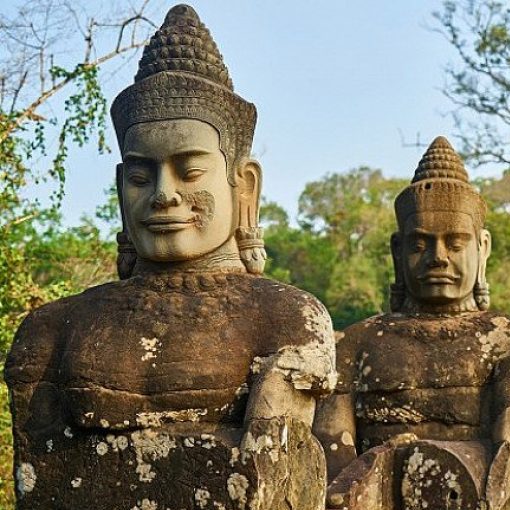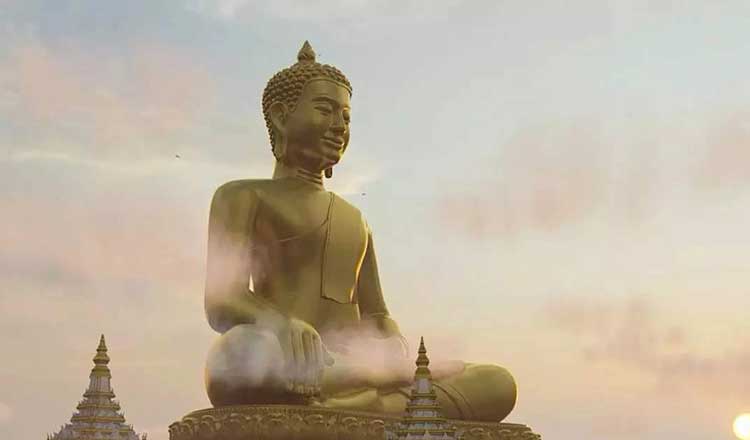When I first stumbled across Buddhism, I wasn’t looking for a religion, but running from one. I was also running from years of serious addiction.
Much of my childhood was spent under the heavy shadow of Christianity, one that left me with more guilt and fear than guidance. The version of Christianity I knew was strict, absolute, and unforgiving. And truthfully, I was never able to believe. Regardless of which version of Christianity I discovered, it simply never made sense to me. Some people just aren’t wired to believe without evidence. Christianity taught me to deny myself, to feel ashamed for simply being human, and to follow blindly. As I got older, I found myself questioning everything. None of the answers I was given made any real sense, and eventually, I stopped asking. I walked away quietly, carrying with me a whole mess of confusion, resentment, and spiritual baggage.
Buddhism to the Rescue
It was years later—burned out, addicted, and struggling to find meaning—that I discovered Buddhism. Not the religious kind, with temples and rituals, but the simple, grounded kind: a philosophy rooted in mindfulness, self-awareness, and the understanding of suffering. What caught my attention was how little it asked of me. No dogma, no worship, no cosmic scoreboard keeping track of my sins. Just the suggestion to look—at myself, at my habits, at my thoughts—and to be honest about what I saw. This book was pivotal for me, and I strongly recommend. It is a no-nonsense look into Buddhist logic for which I will forever be grateful.

#ad
Myself, To the Rescue
Mindfulness was my turning point, and at first, meditation became the replacement for all my addictions. It is so much more to me than that now, and I don’t even think about addiction as I once did, but It began as a simple distraction from the distractions. For the first time, I was invited to simply observe, without judgment.
To sit with my thoughts, no matter how ugly or chaotic they were. Doing this not only taught me much about myself, it also taught me not to fear myself. I started meditating daily, at first just for five minutes a day. Then 10, 15, until I was meditating for an hour every day. Every time I wanted a cigarette, I would meditate. Whenever I felt sad or anxious, I would meditate. And every single time I walked away with a new found sense of strength over what had been plaguing me. Slowly, I began to see how much of my suffering was self-created. My addiction, my anxiety, my constant dissatisfaction—they all stemmed from wanting things to be different than they were.
Through Buddhist principles, I began to deconstruct not only the Christian worldview I’d inherited but also the toxic patterns I’d built around it and in response to it. I let go of the need for cosmic approval, stopped clinging to narratives that said I needed saving. I realized I wasn’t cursed—just caught in a cycle of craving and aversion, of chasing highs and running from pain. Buddhism didn’t give me all the answers. It gave me the tools to stop needing them. Learning to sit with yourself is learning to control yourself.
Meditation Helped Me Save Myself
Getting sober wasn’t easy, but mindfulness made it possible. It helped me understand that urges are just temporary waves. I didn’t have to act on every craving, just like I didn’t have to believe every thought that passed through my mind. Sobriety became less about restriction and more about freedom—from compulsion, from guilt, from the false promise that another drink or drug would fix anything. Which eventually led too “one more cupcake isn’t going to fix anything,” and overall stronger thinking about all manner of destructive behaviors.
Minimalism followed naturally. As I stripped away internal clutter, I found myself wanting less from the outside world too. I started selling my stuff, downsizing, letting go of everything I didn’t need. Not as a trend or an aesthetic, but because I genuinely didn’t want the weight anymore. I didn’t need to impress anyone. I just needed peace—and for the first time, I was learning how to find it. Also, I had already learned that I could live a better life abroad, and getting rid of my stuff was an important part of that journey.
Today, I don’t call myself religious. I don’t believe in gods or supernatural forces. But I do believe in presence, compassion, and the idea that suffering is real, but so is the ability to meet it with clarity and kindness. Buddhism gave me that—not a belief system, but a path. And it’s one I walk, one breath at a time.
I remain sober, years later, and still meditate daily, at the park by my house where I jog. It is very safe and beautiful. I am grateful to live here.

